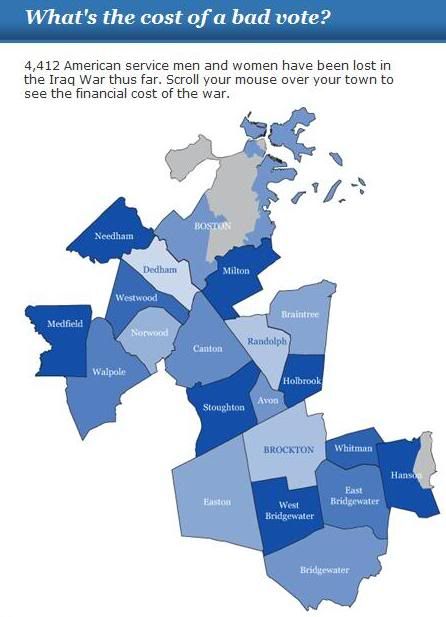(Cross-posted at Open Left.)
 We all know the statistics. Over 4,400 American service men and women killed. Over $730 Billion spent. Longer than American involvement in World War II, longer than the Civil War, longer than the American Revolution, catching up to Vietnam.
We all know the statistics. Over 4,400 American service men and women killed. Over $730 Billion spent. Longer than American involvement in World War II, longer than the Civil War, longer than the American Revolution, catching up to Vietnam.
We all know what a terrible cost the War in Iraq has levied on us. This is a war that my opponent in the Democratic primary, incumbent Stephen Lynch, not only voted for, but also voted to fund at least eleven times.
Still, as frequently as we’ve heard the dizzying and disheartening statistics, we sometimes lose sight of the direct impact this war has had on our communities. While we spend some $13 billion per month on the Iraq War, many of our cities and towns face crippling budget shortfalls as we climb out of this ongoing recession.
To make it clear to the families of Massachusetts’ 9th Congressional district, I have offered a breakdown of the costs, using an interactive map. If you visit the map on my website, you can see what the per capita financial cost to each city and town has been – as well as what that money would have bought in teachers, police, and firefighters over these past seven years.
Iraq certainly isn’t the only issue where my opponent and I disagree, or where he has cast a profoundly bad vote. Stephen Lynch voted for the Patriot Act and its reauthorization, while I believe that it represents an infringement on the civil liberties of law-abiding Americans. Lynch voted for the Stupak Amendment to the health care reform bill, while I am staunchly pro-choice and see the Stupak Amendment as the most profound attack on a woman’s right to choose since the Hyde Amendment of the 1980’s. Stephen Lynch also voted against the health care reform bill, while I support it because it provides tens of millions of Americans with access to health care, allows children to remain on parents’ health care plans until the age of twenty-six, and ends some of the worst abuses of health insurance companies, like “pre-existing conditions” restrictions on children.
There is a clear pattern that, while Stephen Lynch may vote with us Democrats more often than not, the votes where Lynch diverges from us Democrats are among the votes that most shape the path on which our country will head. If you no longer want to face the cost of a bad vote – if you want to elect a Better Democrat – I urge you to get involved and support my campaign. (Also, be sure to vote for me in DFA’s Grassroots All-Stars contest, and encourage friends to do likewise.)